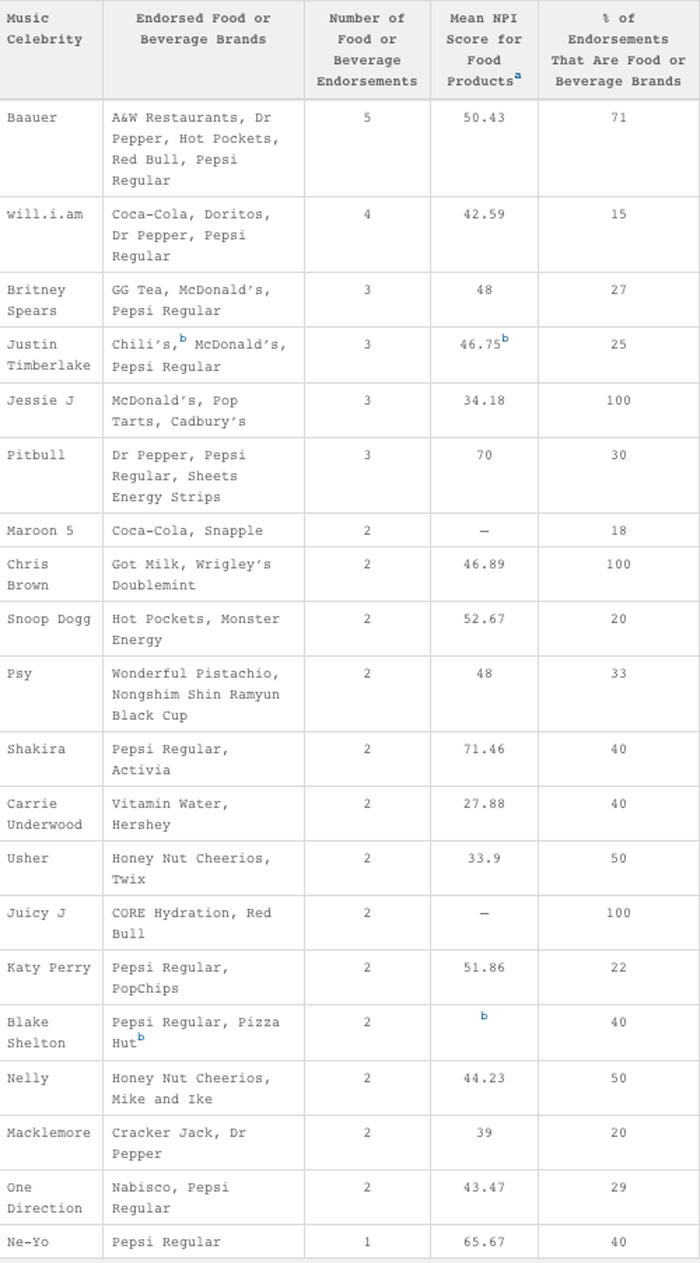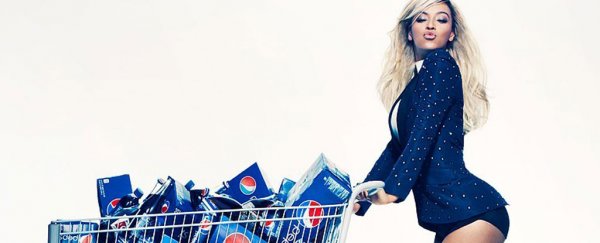Countries across the world are currently struggling with an obesity crisis, and while the reasons behind the problem are definitely complex, there's one thing for sure that isn't helping: celebrity endorsement deals worth millions of dollars designed specifically to encourage consumers, especially young ones, to buy more junk food and soda.
Now a new study by researchers at New York University is the first to conduct a thorough nutritional analysis of the food and beverage products marketed by pop music stars, revealing a supermarket aisle's worth of big money endorsements for sugary drinks, fast food, and sweets – but only one celebrity promoting a natural food that could be viewed as healthy (pistachios, plugged by PSY).
"Because of our nation's childhood and teenage obesity public health crises, it is important to raise awareness about how companies are using celebrities popular with these audiences to market their unhealthy products," said lead researcher Marie Bragg. "Research has already shown that food advertising leads to overeating, and the food industry spends US$1.8 billion per year marketing to youth alone."
It's easy to see where some of that $1.8 billion goes when you look at the huge number of music stars inking endorsements as identified by the researchers. After going through Billboard's 'Hot 100′ song charts from 2013 and 2014 to make a list today's successful acts, they then catalogued 15 years' worth of endorsements recorded between 2000 and 2014 by advertising database AdScope, which tracks ads on TV, radio, and print. The researchers also looked at YouTube and other online sources.
What they found was 65 pop stars who had made deals with 57 different food and beverage brands. Among these, some of the most famous and lucrative deals are Beyonce's arrangement with Pepsi – estimated to be worth $50 million – and Justin Timberlake's "I'm lovin' it" contract promoting McDonalds, thought to be worth $6 million.
Timberlake was also among the pop celebrities with the most endorsements, which also included Baauer, will.i.am, Maroon 5, and Britney Spears, Pitbull, and Jessie J. But you can see more – including Chris Brown, Snoop Dogg, Shakira, Katy Perry, and more – along with the products they're signed up with, in the image below, and in the study published in Pediatrics.
 Pediatrics
Pediatrics
Now celebs inking endorsement deals isn't necessarily a bad thing – even though some fans might think of it as selling out – but when the researchers examined the nutritional content of the foods being promoted, it became apparent there's a real problem here.
Twenty-one out of 26 food products (81 percent) the team looked at were deemed "nutrient poor" by the researchers, and 49 of the beverages endorsed (71 percent) were sugar-sweetened, with full-calorie soft drinks the most commonly endorsed drink – and water-related endorsements occurring only three times.
"These celebrity endorsement deals are often worth millions of dollars each, suggesting companies find them critical for promoting products," said Bragg.
The researchers acknowledge that their observational study wouldn't have caught every music celebrity endorsement between 2000 and 2014, nor that they've necessarily tracked exposure to the ads as fully as a larger study might do. But it's nonetheless an eye opener on the pervasiveness of pop stars plugging unhealthy foods, and the researchers hope policy changes and shifts in public perception will turn this phenomenon around.
"The popularity of music celebrities among adolescents makes them uniquely poised to serve as positive role models," said one of the researchers, Alysa N. Miller. "Celebrities should be aware that their endorsements could exacerbate society's struggle with obesity – and they should endorse healthy products instead."
